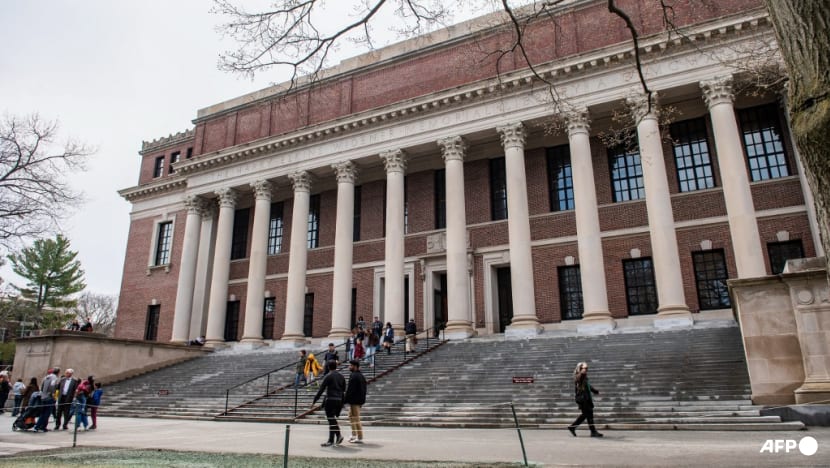Harvard sues Trump administration for blocking enrolment of foreign students

People enter and exit the Harry Elkins Widener Memorial Library on the Harvard University campus in Cambridge, Massachusetts, on Apr 15, 2025. (File photo: AFP/Joseph Prezioso)
Harvard University sued the Trump administration on Friday (May 23) over its decision to revoke the Ivy League school's ability to enrol international students, ratcheting up White House efforts to conform practices in academia to President Donald Trump's policies.
In a complaint filed in Boston federal court, Harvard called the revocation a "blatant violation" of the US Constitution and other federal laws, and had an "immediate and devastating effect" on the university and more than 7,000 visa holders.
"With the stroke of a pen, the government has sought to erase a quarter of Harvard's student body, international students who contribute significantly to the University and its mission," Harvard said.
"Without its international students, Harvard is not Harvard," the 389-year-old school added.
Harvard asked a federal judge to block the revocation, citing "the immediate and irreparable harm inflicted by this lawless action." The case was assigned to US District Judge Allison Burroughs an appointee of Democratic President Barack Obama.
Trump's pressure on Harvard is part of the Republican's broader campaign to compel universities, law firms, news media, courts and other institutions that value independence from partisan politics to align with his agenda
The campaign has included efforts to deport foreign students who participated in pro-Palestinian protests but committed no crimes, retaliate against law firms that employ lawyers who have challenged Trump, and a suggestion by Trump to impeach a judge for an immigration ruling the president didn't like.
Harvard, based in Cambridge, Massachusetts, has pushed back hard against Trump, having previously sued to restore some US$3 billion in federal grants that had been frozen or cancelled.
Law firms, including WilmerHale and Susman Godfrey have also sued, while US Chief Justice John Roberts said impeaching judges is not an appropriate response to disagreement with their rulings.
Some institutions have made concessions to Trump. Columbia University agreed to reform disciplinary processes and review curricula for courses on the Middle East, after Trump pulled US$400 million in funding over allegations the Ivy League school had not done enough to combat antisemitism.
Meanwhile, law firms such as Paul, Weiss and Skadden Arps agreed to provide free legal services to causes Trump supports. White House spokesperson Abigail Jackson dismissed Harvard's lawsuit.
"If only Harvard cared this much about ending the scourge of anti-American, anti-Semitic, pro-terrorist agitators on their campus they wouldn't be in this situation to begin with," Jackson said.
"Harvard should spend their time and resources on creating a safe campus environment instead of filing frivolous lawsuits," she added.
She said the termination was justified because of Harvard's "fostering violence, antisemitism, and coordinating with the Chinese Communist Party".
The revocation follows Noem's demand on Apr 16 for a large trove of information from Harvard about student visa holders.
In a letter to Harvard, which was attached to the complaint, Noem said the information was needed because the university had "created a hostile learning environment for Jewish students due to Harvard's failure to condemn antisemitism."
On Thursday, Noem said Harvard could restore its certification by turning over within 72 hours a raft of records about international students, including video or audio of their protest activity in the past five years.
HARVARD DEFENDS "REFUSAL TO SURRENDER"
Homeland Security's justification is "the quintessence of arbitrariness," Harvard said in its complaint.
In his letter on Friday, Garber said Harvard responded to Homeland Security Department requests as required by law.
In a letter to the Harvard community, the school's president Alan Garber condemned the administration's actions.
"The revocation continues a series of government actions to retaliate against Harvard for our refusal to surrender our academic independence and to submit to the federal government's illegal assertion of control over our curriculum, our faculty, and our student body," Garber wrote.
Harvard enrolled nearly 6,800 international students in its current school year, equal to 27 per cent of total enrollment.
In its complaint, Harvard said the revocation would force it to retract admissions for thousands of people, and has thrown "countless" academic programs, clinics, courses and research laboratories into disarray, just a few days before graduation.
Harvard called the revocation "unlawful many times over", saying the government violates the First Amendment by using coercion to police private speech and forcing universities to surrender their academic freedom.
















